Peter MALONE
Saturday, 18 September 2021 19:34
Man in the Brown Suit, The
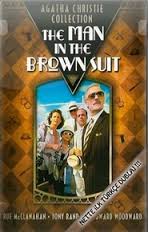
THE MAN IN THE BROWN SUIT
US, 1989, 90 minutes, Colour.
Rue MacClanihan?, Stephanie Zimbalist, Edward Woodward, Tony Randall, Ken Howard.
Directed by Alan Grint.
The Man in A Brown Suit is an Agatha Christie murder mystery. Written in the 1920s, it is updated in a very American style. This may not please the please the purists - the style is very much American television and action adventures.
Stephanie Zimbalist (Remington Steele ) is the intrepid heroine. Other stars of popular television series appear, including Rue MacClanihan? of The Golden Girls, Edward Woodward of The Equalizer, Tony Randall of The Odd Couple and other series, Simon Dutton of The Saint.
The villain is rather easier to spot than usual, especially if the audience is alert to Tony Randall's capacity for disguises (as in The Seven Faces of Dr Lao).
Routine and broadly entertaining Agatha Christie.
1. Entertaining murder mystery in the Agatha Christie vein? Updated and Americanised? Television stars and their popularity?
2. African locations, the exotic atmosphere, hotels and mansions, the Kimberleys, the ship, the train, the waterfall? Musical Score?
3. Title, the focus on Harry and the irony that he had taken his friends identity? His continually turning up?
4. The prologue in the Kimberleys, Anita, the fight, the diamonds? The killing at the Cairo airport? The murder of Anita? The complications of the plot? Sufficient clues? Flashbacks, explanations?
5. Anne at the airport, witnessing the murder, photographs? Her becoming involved, the discussions with Colonel Race? Her decision to go on the boat, the piece of paper, on board, sick? Friendship with Suzy? Getting the new cabin, the maid, the searching of the cabin? Finding the diamonds with Suzy? The man in the brown suit and the stabbing, helping him, telling the story to Suzy, her being pushed overboard and his rescuing her, the dance? Her lists and her suspicions? The importance of the Reverend Chichester, of Underhill, of Sir Eustace? The attraction towards Colonel Race and suspicions? In the market and her being kidnapped, the escape? On the train? At the falls and her being pushed over? Saved by Harry, the reconciliation? To Cairo, the jewels, the showdown? Sir John and the happy ending?
6. Sir Eustace and Edward Woodward's style, the bully Englishman? Jovial, on the boat, snubbing Underhill, winning the prize? The train, the journey? Africa? The final revelation at the end of the line?
7. The Reverend Chichester, Tony Randall's mystery?
8. Underhill, subservient, suspicious, the black eyes? The truth about his family?
9. Suzy, the brash American wealthy woman, her many husbands, gossip, the adventure?
10. The CIA? The resolution and the plot? Harry, the fight in the Kimberleys, the deaths, on board and the stabbing? Friendship with Anne? Rescuing her twice? His being Sir John?
11. Popular characterizations? with a touch of the stereotype? Clues? Resolution?
Published in Movie Reviews
Published in
Movie Reviews
Tagged under
Saturday, 18 September 2021 19:33
Mrs Miniver
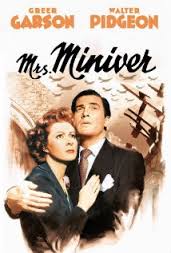
MRS MINIVER
US, 1942, 134 minutes, Black and white.
Greer Garson, Walter Pidgeon, Teresa Wright, Dame May Whitty, Reginald Owen, Henry Travers, Richard Ney, Henry Wilcoxon, Helmut Dantine, John Abbott.
Directed by William Wyler.
Mrs Miniver was an acclaimed American classic of 1942. It won the Oscars for best film as well as best director for William Wyler and best actress for Greer Garson. Teresa Wright (who was nominated that year for best actress for Pride of the Yankees) won best supporting actress. It also won Oscars for cinematography and for James Hilton as screenwriter.
Greer Garson had emerged in films with Goodbye Mr Chips and was soon teamed with Walter Pidgeon in a series of very popular films from Blossoms in the Dust to Madame Curie, Mrs Parkington, to the more frothy Julia Misbehaves and the sequel The Miniver Story. During the 50s they appeared together in Scandal at Scourie. Greer Garson was considered one of the great ladies of the Hollywood screen of the 40s. Walter Pidgeon continued a strong career into the television era.
The film has a cast of regular character actors from this period led by Dame May Whitty. Helmut Dantine often appeared as a Nazi in this time.
The film offered a powerful image of war for the Americans, newly entered into World War Two after Pearl Harbor. It offered a picture of the English resistance. It is an idealised portrait of a British family – but symbolises the courage and pluck of ordinary British citizens and the war effort.
1. This film is considered a classic of the war period, its impact in the forties? Its impact in succeeding decades?
2. The style of the film and the M.G.M. dramas of the forties? Black and white photography, music, sets etc.? The popularity in their day of the combination of Greer Garson and Walter Pidgeon? The humanity implied in the dramas?
3. How successful a propaganda film was this? The emphasis on propaganda, a tribute to the British in time of war? The boosting of morale for the war, 1942, now?
4. The qualities of humanity that pervaded the film? The appropriate amount of sentiment, sentimentality? Its humane portrayal of the issues of life and death of ordinary people?
5. The contrast between the world of 1939 and the post war world? The changes the war was to achieve? The film as an aid to understanding the changing aspects of the thirties and forties because of the war.
6. Audience involvement in the film because of the opening? Mrs Miniver in London, the atmosphere of shopping, the buses in the streets, buying the bat? The atmosphere of the country station and looking at the rose, the contrast with Clem and buying the car? The ordinary issues of ordinary life?
7. The detailed attention to life in the village? Mrs Ballard at the station, the flower show, the shops, the church and the influence of the vicar? The traditional values that were cherished? What was important about them?
8. The importance of the detail of life in the Miniver home? The quality of married life? The quality of family life? The children? servants?
9. The contrast with Lady Beldon and her way of life? Aristocracy, aristocratic values of the past? The contrast with Carol? Lady Beldon's memories of her own life when prompted by Mr Miniver? The importance of the interview between the two women The consent to Carol's marriage? Lady Beldon at the flower show, their decision about the rose and giving it to Mr. Bellard? As a symbol of the ways in England?
10. The announcement of war? The church scene, the sermon of the vicar?
11. The portrayal of the war effort and the keeping up of morale? How real does this seem now? The uncertainties of the outcome of the war in the early forties?
12. How appropriate was the melodrama of the prisoner in the garden? Was he a real person, his difficulties? Kay Miniver's handling of this situation? The fear for an ordinary housewife?
13. The portrayal of Dunkirk and the involvement of the ordinary men with their small boats, the effect it had on then?
14. The importance of the sub-plot with Carol? How attractive a girl? Vin and his pompous style after the university? Their falling in love, their communication with each other? Marriage? The worry about Vin's possible death and visualising him in the plane, the Miniver's looking out the window at the planes? The pathos of Carol's death and its effect on them all? How sad for the audience?
15. How was the flower show a final symbol of the changing world and a preservation of values? The pathos with those who died so soon afterwards especially Mr Ballard? How well handled was the sequence of Mr Ballard going to receive the prize?
16. What were the basic appeals of this film? As Does it deserve its reputation? The academy awards that it won?
Published in Movie Reviews
Published in
Movie Reviews
Tagged under
Saturday, 18 September 2021 19:33
Monsieur Vincent
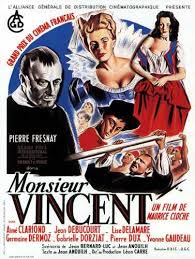
MONSIEUR VINCENT
France, 1937, 111 minutes, Black and white.
Pierre Fresnay, Aime Sclarione, Gabrielle Borziand, Michele Bouquet, Jean Carmet.
Directed by Maurice Cloche.
Monsieur Vincent is one of the acclaimed film biographies of a Catholic saint. It emerged in the period of neo-realism in French cinema after World War Two. Director Maurice Cloche had been making films since the mid-30s and has continued for several decades. This was his outstanding work for international audiences.
The film recreates in black and white the atmosphere of France during the early 17th century and the reign of Louis XIV. Monsieur Vincent is a good priest, takes his place among the galley slaves in order to experience the poverty and hardships of the period (in the later vein of Les Miserables). This is the period to be seen in the Dumas stories, especially of The Three Musketeers and the time of Cardinal Richelieu. A grimmer picture of this period is seen in Ken Russell’s version of John Whiting’s The Devils.
Pierre Fresnay first performed in films in 1915. During the 1930s he appeared in the classic films Fanny and Marius as well Hitchcock’s 1934 The Man Who Knew Too Much. He appeared in Renoir’s The Grand Illusion and continued to make films throughout World War Two. He appeared in such classics as Le Corbeau in 1943. After Monsieur Vincent he appeared as Offenbach in The Paris Waltz and appeared in several films with religious overtones especially God Needs Men (1950) and The Unfrocked One (1954).
This is a classic film of the French cinema.
1. A good religious film? What religious values did it present? How sincere was its religious impact? Why?
2. What were the main religious qualities of the film? The personality of Vincent de Paul? His good works? The attitude that the film took towards him and wanted to communicate to its audience?
3. A balanced picture of Vincent de Paul? Was his background well explained? rushed too much the final years at the end?
4. How, does one explain Vincent de Paul? The background of his youth? Of his priesthood? Of his initial ministry? His work in the parish, courage towards opposition? The variety of his work and its impact on him? Mixing with rich and poor? His holiness? How did the film explain Vincent's ho1iness? In what did it consist?
5. How, important were the sequences of his arrival in the village and his coping with the plague? How well did the film communicate his charity? The fear of the people? Their respect for him?
6. Did the film communicate well the poverty of the people of the time? Vincent's concern for the poor? The Christian motivation for being poor and far his being poorer than they?
7. How well did the film show French society of the time? The contrast between rich and poor? Was it an accurate picture of the rich?
8. Why did Vincent have such an ability to cope with the rich? Did he use it well? Should he have ignored the rich?
9. How was he a consolation to the poor? How did he gather people to himself to assist the poor? Was their assistance genuine or not? Which sequences illustrated this best?
10. Did the film make clear the need for organising his followers into a religious order? Or his establishing an order of nuns? For the need of having the nuns working in the streets to help the poor? Which sequences illustrated this best?
11. How important was Vincent's experience in the galleys? What did he discover? Did the film portray his suffering in the rowing too melodramatically? Or was this a vivid realization of what he had to do?
12. The influence of Vincent on society ladies and urging them to charity?
13. His association with Louise De Marillac? Her collaboration in the work of charity? The issue of the clash between them?
14. The conversation sequences with himself as elderly and with the Queen? How well did he estimate the importance of his work? Did the film gloss over too quickly these years of Vincent's mature experience? Or was it able to handle them well?
15. How moving were the sequences of his death? Why? The importance of his encounter with the novice at the end?
16. How inspirational a film was this? What values did it best present? Comment on its cinematic presentation of a saint. What techniques did it use to present Vincent as a saint: the black and white photography, the editing of the sequences, the close-ups of Vincent...?
Published in Movie Reviews
Published in
Movie Reviews
Tagged under
Saturday, 18 September 2021 19:33
Monty Python and the Holy Grail

MONTY PYTHON AND THE HOLY GRAIL
UK, 1975, 91 minutes, Colour.
Graham Chapman, John Cleese, Eric Idle, Michael Palin, Terry Jones, Terry Gilliam, Connie Booth.
Directed by Terry Jones, Terry Gilliam.
was the first major film by the Monty Python Group. After a successful series on British Television and a compilation of many of these episodes for a feature, And Now For Something Completely Different, the Python Group began a series of very successful features: The Life Of Brian, The Time Bandits, The Meaning of Life.
The style and quality of the Python humour depends on the personalities, the writing and acting contributions of the Group: Graham Chapman, John Cleese, Terry Gilliam, Eric Idle, Terry Jones, Michael Palin. Eric Idle contributes much of the music and Terry Gilliam the animation. The Group takes traditional and respected myths and legends and sends them up.
This very contemporary kind of satire means that the material can date but in its time can have telling impact. The Group plays many roles with the possibility of variety of impersonation and a clever display of acting skills. There is much visual humour and a strong reliance on nonsense and verbal humour. Jabberwocky continues the mediaeval satire begun in this film. The credits have an amusing satire on Swedish and Ingmar Bergman films.
1. The Monty Python Group: contributions of the individuals in terms of acting, writing, music? The reputation over the years from television to films? Books? The contribution of this film to their reputation?
2. The background of stage comedy, review, television? The background of The Goons? Verbal and visual humour? Coherency logic, lack of logic, verbal and visual logic? Suggestion? Parody? The spoofing of myths and legends? The past and the present - and the intrusion of the present into the past? The credits and the satire on Ingmar Bergman?
3. The purpose of the film: amusement, comedy, jolt and offence, satirising for British audiences, universal audiences?
4. The production values: the cast and the variety of parts played, special effects, costumes and decor, animation? The recreation of the Camelot world - Python style?
5. The personalities and their acting styles, mime, mimic, pantomime, farce, range of voices and accents?
6. The use of myths and genres? Presupposing audience knowledge and their use in films especially in stereotype? The enjoyment of the myths, the send-up of the conventions? The impact for the British, ages of society, religion, moral codes, behaviour?
7. King Arthur and Camelot as fair game for British satire? The particular satire on the King and his pretensions, his squire, the various knights and their names, quests and missions? God and his intervention about the Grail? The endurance tests to find the Grail?
8. The satire on the mediaeval world: the blend of reality and unreality? Insanity and lunacy? Arthur and his squire and their not having horses? The mockery of the knights? The world of farmers, the plague and the dead, mediaeval cities?
9. The animation with God giving the mission for the Grail? The historian and his interviews - and his being killed? The police intrusion and their arrest of the cast?
10. The knights and the build-up to presenting each of them? Their adventures for example the encounter with the French knights, the three-headed knight, the damsel and Swamp Castle, the knights of Ni?
11. The mission for the grail - the beast, the enchanter, the riddles, the bridge? The French knight and the excremental jokes?
12. The collapse of the parody at the ending with the present intruding on the past? Laughter, amusement, insight by satire?
Published in Movie Reviews
Published in
Movie Reviews
Tagged under
Saturday, 18 September 2021 19:33
Miles From Home
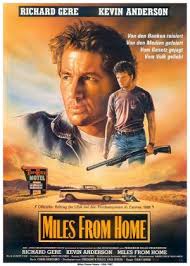
MILES FROM HOME
US, 1988, 108 minutes, Colour.
Richard Gere, Kevin Anderson, Brian Dennehy, Charles Durning, Terry Kinney, Penelope Ann Miller, Helen Hunt, Laurie Metcalfe, Judith Ivey, John Malkovich.
Directed by Gary Sinise.
Miles From Home is a social drama about American life and farmers. It is in the vein of three films of 1984: Country, Places in the Heart, The River. It also has echoes of such films as The Grapes of Wrath with a touch of Bonnie and Clyde. Another comparison might be Emilio Estevez’s film about a man on the run against social and bank oppression; Wisdom.
This film was written by Chris Gerolmo, the writer of the hard-hitting Mississippi Burning. It is also a star vehicle for Richard Gere as well as for Kevin Anderson (Orphans).
The film is particularly American in its tone: the visit of Kruschev to Iowa in 1960, prosperity in the U.S. in the '60s, the decline in the '70s, the fiscal failures of farming in the '80s.
There is a guest performance by Charles Durning as the boy's father and John Malkovich as a reporter.
1. Effective social drama, Americans, the land, economics? American myths and legends - especially of outlaws rebelling against the system?
2. The Iowa locations: the corn farms, the country roads, the towns? Musical score?
3. The impact of the prologue: the boy's father and his meeting Khrushchev, the celebration of Khrushchev’s visit, American-Russian? relationships? The father and his two boys? The hold over the boys in their subsequent life? The black and white newsreel style of the prologue?
4. The transition to the '80s and Frank gazing out the window, Frank reflecting? Hardships, the rain, the corn crops, being ruined? The relationship between Frank and Terry? Hard work, laying off the help, the failure of the farm? Tom's arrival and the bank foreclosure? Frank's violent reaction? The decision to auction off their goods?
5. Frank and his anger, his rages, the decision about burning the farm down, setting it alight, leaving? Pressurising Terry? Eluding the police, going to the caravan and his night with Frances? Handcuffing the policeman, taking
the car? Going to the club and talking with the exotic dancer, the arrangement with the newspaper interview? The issues, playing to the gallery? Taking the cars, going to the rodeo and the rich man pushing on the bull with the heavy load, his challenging the man and shooting the bull? The decision to hold up the bank? The possibility of his shooting Tom? The farm worker refusing to go with him, Terry's leaving him? Their going to work on the farm, the sympathy of the farmer? The final clash with Terry, the fight? Going to the grave and trying to free himself from his father? The reconciliation, getting the fast car - and driving into a future?
6. Terry as the younger brother, working, his friendship for Frank? The sale and his bet with Frank to sell something, meeting Sally and falling in love? Sharing the experiences with Frank? Worried about playing to the gallery? Refusing to rob the bank? Fighting with Frank? Sally and her trying to get
the law on his side? His staying with her, giving himself up to the police?
7. The sketch of Sally and Jennifer, going to the auction, their friendships with the brothers, Sally falling in love, Jennifer and her talks with Frank? Sally finally helping Terry?
8. The cameo by Judith Ivey as Frances, welcoming the brothers, friendship, the night with Frank?
9. Tom and his being at school with the brothers, fiscal failures, the bank and the foreclosure? The hold-up?
10. The journalist and his interviews, the nature of his questions, giving the brothers publicity?
11. The friendship of the dancer, talking, the interview? The farmer and his family and giving the brothers work?
12. The incident with the bull, the fat man and his cruelty? Symbol of the action of the film? Frank's confrontation, the shooting of the bull, the acclaim of the audience?
13. Themes of America, the land, hardships, justice?
14. The theme of outlaws, rebelling against the system - the tradition of the James Brothers of the 19th-s;,century, the outlaws of the Depression? Violence?
15. The particularly American style of the film? Its impact for wider audiences?
Published in Movie Reviews
Published in
Movie Reviews
Tagged under
Saturday, 18 September 2021 19:33
Maccheroni
MACCHERONI
Italy, 1985, 104 minutes, Colour.
Jack Lemmon, Marcello Mastroianni.
Directed by Ettore Scola.
Macaroni is a pleasing star vehicle for Jack Lemmon and Marcello Mastroianni. It was co-written and directed by Ettore Scola (The Ball, Passion of Love, The Family) .
Photographed beautifully in Naples, the film shows an American returning after 40 years to the city where he served at the end of World War Two. He has forgotten the attachments he made at that time. However, the brother of his girlfriend has not forgotten and indeed has been writing letters as the American for 40 years. Their initial meeting is difficult, but gradually there is a transformation of the American. The film is one of nostalgia as well as hope. The two actors are very much at home in their roles. Lennon is the crusty American who is mellowing. Mastroianni steals the film as an engagingly optimistic brother and father.
1. Enjoyable? Blend of the serious and comic? Italian and American cultures? Age, memory, reconciliation?
2. The use of Naples, the photography of the city, its beauty? Musical score?
3. The stars, the place of this film in their careers? Embodying the American and the Italian? Together?
4. The focus of the film on a few days, special days, transformation after 40 years? A chance for new life? Death and life?
5. Jack Lemmon as Robert: arriving, crusty, changing his travelling plans, in the car, with the secretary, the arrangements, the hotel, his being tired, headaches, arrangements?
6. The contrast with Antonio and his arrival, bothering the hotel staff, meeting Robert, not being welcomed, the photo of Maria, his virtually being ousted, the effect on him? Robert having no memories?
7. Robert as the American in his 60s, the past 40 years, wife and family, divorce and bitterness, his work, expertise, people trying to undermine his position? His memory of despair during the '70s and '80s? Depression? His going to meetings, his speeches? The television interview?
8. Antonio and the 40 years: a genial man, eccentric, nice? His work in the archives and its cold? Smoke and his illness? The motivation for his visit, being ousted, hurt? His revelation of 40 years: love for Maria, on her behalf being hurt, the decision to write the letters, the passing of the years, the international adventures, his own marriage and warmth, his love for his son, interested in his career, the music? Writing plays, the performance? His love for Carmelina? Everybody knowing him, knowing the family's story?
9. Robert wandering the city, getting out of the taxi, remembering Maria? Relenting towards Antonio, wanting to return the photo, going to his office, talking, going to the town to see Antonio's grandnephew, meeting Maria and her husband, the warmth of the visit, understanding the past, the visit to the studio and seeing Culio sing, going to the theatre and seeing the performance, the visit to Antonio's mother and her telling his fortune? Hearing of the letters, his astonishment, reading them, his reaction? The re-bonding of the two?
10. His having to return, the phone call at the airport, keeping the plane waiting, leaving? Trying to find Antonio and Giulio? Giulio's predicament? Going to Carmelina, the steps in tracking down where Giulio was, the girlfriend, finding Giulio, the gangsters with Antonio and bashing him, the fight? the charm? (Like the hero of the letters?) Their being together, going to buy the sweet, finding Antonio dead, his pain and sorrow?
11. The meal with the whole family, the full plate and, his making a place for Antonio, the camera tracking on the faces of each of those present? Their relationship with Antonio? Friendship, giving, a future?
12. Portrait of the two men, their lives, regrets, generosity, meaning and opportunity?
Italy, 1985, 104 minutes, Colour.
Jack Lemmon, Marcello Mastroianni.
Directed by Ettore Scola.
Macaroni is a pleasing star vehicle for Jack Lemmon and Marcello Mastroianni. It was co-written and directed by Ettore Scola (The Ball, Passion of Love, The Family) .
Photographed beautifully in Naples, the film shows an American returning after 40 years to the city where he served at the end of World War Two. He has forgotten the attachments he made at that time. However, the brother of his girlfriend has not forgotten and indeed has been writing letters as the American for 40 years. Their initial meeting is difficult, but gradually there is a transformation of the American. The film is one of nostalgia as well as hope. The two actors are very much at home in their roles. Lennon is the crusty American who is mellowing. Mastroianni steals the film as an engagingly optimistic brother and father.
1. Enjoyable? Blend of the serious and comic? Italian and American cultures? Age, memory, reconciliation?
2. The use of Naples, the photography of the city, its beauty? Musical score?
3. The stars, the place of this film in their careers? Embodying the American and the Italian? Together?
4. The focus of the film on a few days, special days, transformation after 40 years? A chance for new life? Death and life?
5. Jack Lemmon as Robert: arriving, crusty, changing his travelling plans, in the car, with the secretary, the arrangements, the hotel, his being tired, headaches, arrangements?
6. The contrast with Antonio and his arrival, bothering the hotel staff, meeting Robert, not being welcomed, the photo of Maria, his virtually being ousted, the effect on him? Robert having no memories?
7. Robert as the American in his 60s, the past 40 years, wife and family, divorce and bitterness, his work, expertise, people trying to undermine his position? His memory of despair during the '70s and '80s? Depression? His going to meetings, his speeches? The television interview?
8. Antonio and the 40 years: a genial man, eccentric, nice? His work in the archives and its cold? Smoke and his illness? The motivation for his visit, being ousted, hurt? His revelation of 40 years: love for Maria, on her behalf being hurt, the decision to write the letters, the passing of the years, the international adventures, his own marriage and warmth, his love for his son, interested in his career, the music? Writing plays, the performance? His love for Carmelina? Everybody knowing him, knowing the family's story?
9. Robert wandering the city, getting out of the taxi, remembering Maria? Relenting towards Antonio, wanting to return the photo, going to his office, talking, going to the town to see Antonio's grandnephew, meeting Maria and her husband, the warmth of the visit, understanding the past, the visit to the studio and seeing Culio sing, going to the theatre and seeing the performance, the visit to Antonio's mother and her telling his fortune? Hearing of the letters, his astonishment, reading them, his reaction? The re-bonding of the two?
10. His having to return, the phone call at the airport, keeping the plane waiting, leaving? Trying to find Antonio and Giulio? Giulio's predicament? Going to Carmelina, the steps in tracking down where Giulio was, the girlfriend, finding Giulio, the gangsters with Antonio and bashing him, the fight? the charm? (Like the hero of the letters?) Their being together, going to buy the sweet, finding Antonio dead, his pain and sorrow?
11. The meal with the whole family, the full plate and, his making a place for Antonio, the camera tracking on the faces of each of those present? Their relationship with Antonio? Friendship, giving, a future?
12. Portrait of the two men, their lives, regrets, generosity, meaning and opportunity?
Published in Movie Reviews
Published in
Movie Reviews
Tagged under
Saturday, 18 September 2021 19:33
Murder of Quality, A
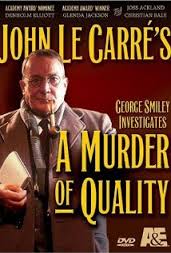
A MURDER OF QUALITY
UK, 1991, 110 minutes, Colour.
Denholm Elliot, Glenda Jackson, Joss Ackland, Billie Whitelaw, David Threlfall, Christian Bale.
Directed by Gavin Millar.
A Murder of Quality was written for the screen by John Le Carre (his only screenplay) from a novel of the early '60s. His character, George Smiley, was to become the centre of a series of novels and celebrated mini-series based on the novels, starring Alec Guinness.
Denholm Elliott is very good as the shabby but alert former agent, George Smiley. Glenda Jackson is his former colleague, Ailsa Brimley. Together they investigate a murder in a small town - somewhat in the manner of a combination of Miss Marple and Inspector Morse.
Joss Ackland, as a homosexual teacher, leads a strong cast. The murder is interesting in itself, as is the detective work. The title of the film gives an indication of themes as well, a critique of British class consciousness, British snobbery, and the presuppositions of the aristocracy in taking the law into their own hands and despising lower classes.
The film is what one would desire of a British murder mystery.
1.Interesting and entertaining drama, murder, mystery?
2.The work of John Le Carre, George Smiley's character and background, Le Carre writing the screenplay? The background of secret service investigations? As applied to local detection?
3.The British settings, the town, the school? The difference between the classes and this being brought out? Characters, locations? The strong cast? Musical score?
4.The opening, the focus on different facets of the school, the murder? The confusion, the introduction of characters and themes?
5.George Smiley, in retirement, Denholm Elliott's shabby but alert style? The visit of Ailsa Brimley? Her concern about the letter? The possibility of a murder? Her persuading him to investigate? The phone calls, ringing Terence Fielding, the discovery of the actual death? His arrival in the town, his letters of introduction? Inspector Rigby and his concern, co-operation? Their work together? His assistants? Smiley and his meeting the people in the town, concealing his identity and his contact with Inspector Rigby? The dinner hosted by Terence Fielding, their talking confidentially? The bond with Fielding's brother in the secret service? His interviews, getting clues? Encounters with Perkins? Listening to the pathologist's report? His interviews with Dr Rode and discoveries about himself, about Stella? His being welcomed, his being snubbed? Encountering mad Janey? Ailsa's coming, her discovery about the clothes? Their pursuit of the truth? The information about Fielding, inviting him to the meal, the confrontation? The satisfactory explanations, solution? Their reaction to the murder of quality, Fielding's snobbery - and his accusing them of being snobs themselves? The portrait of Smiley and of Ailsa?
6.Terence Fielding, his family background, his story? The comparisons with his brother? His homosexuality, its effect on his career? People blackmailing him? His work at the school, having no pension? His relationship with the boys, class, the poetry? His interest in Perkins? Concern about Perkins cheating? The hosting of dinners, the table talk? Snobbery? His encounters with Smiley, collaborating with the investigation? The flashbacks, his motivations, despising of Stella Rode, his shrewdness, the violence of the murder? His covering, his discovery of the truth about Perkins, murdering him? His show of grief about Perkins' death? His being unmasked, asking for mercy - his arrest?
7.Inspector Rigby, a man of the town, different class? His work, investigations, the pathologist, the clues? His tiredness? Collaboration with Smiley? The interviews? The death of Perkins? The pathologist's view? The pursuit of the truth, the arrest? A portrait of hardworking police?
8.Perkins, his crucial presence on the night of the death? His cheating? His place in the school, authority amongst the boys, relationship with Mr Fielding? His taking the exam, copying it? His upset, telling it to the violin teacher? His being murdered?
9.Dr Rode, discovering the body of his wife, the scenes of upset, in the church - and the help of the vicar? The writing letters for therapy? His bewilderment, interrogations? His place on the school staff? His being looked down on, flattered by Fielding, staying behind? The picture of his wife, her church connections, her bitterness, her blackmailing people emotionally? Her power over people? Her death - and her husband's reaction to her death, his assessment of her character after she died?
10.Mad Janey, the police suspicions, wandering the hills? The clothes? The interview with Smiley? The night of the murder, seeing it, getting the clothes, running away?
11.The portrait of the school staff - the Hechts, the marriage, work in the school, snobs, the wife and the direction of the play? Their aristocratic manner? Playing squash, being interrupted by Smiley, under suspicion? Felix D'Arcy, his manner in the classroom, his reputation, living with his sister? His going to the vet, the affair with the young girl? His wanting to conceal the letter, his attitude towards Stella Rode and her blackmail? At home, suspicious, a coward? The visit to the home, his sister denouncing him?
12.The background gallery of characters, the sympathetic violin teacher, the young girl having the affair with D'Arcy, the pathologist and his examination? The townspeople, the students at the school - classes, putting on the play? Adding to the authentic feeling, the sense of realism for the murder mystery and the investigation?
Published in Movie Reviews
Published in
Movie Reviews
Tagged under
Saturday, 18 September 2021 19:33
Murder: By Reason of Insanity
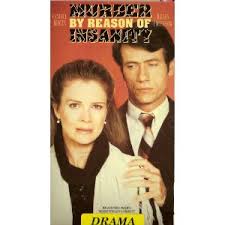
MURDER: BY REASON OF INSANITY
US, 1985, 100 minutes, Colour.
Candice Bergen, Jurgen Prochnow, Hector Elizondo, Eli Wallach.
Directed by Anthony Page.
Murder: By Reason of Insanity is based on a true story about a Polish couple who emigrated to the United States. The wife is able to achieve and bring up her family. The husband, well-qualified as a nuclear scientist, is unable to find a job and mental instability arises. He feels himself, his position as a man and as head of the household, threatened by his wife and American society. He becomes violent. In the court cases he is outspoken and is sent to a mental institution. Shrewdly, he plays up to the authorities in the institution and eventually is allowed day passes. He murders his wife. The film ends with a comment that legislation was changed for allowing patients with criminal instability to be allowed out so freely.
Candice Bergen is very effective as the wife. Jurgen Prochnow (The Boat, Dune, Beverly Hills Cop II) is credible as the husband. Hector Elizondo and Eli Wallach are in support as lawyer and psychiatrist.
The film is dramatic, the court cases are particularly forceful, the threat to the wife and children believable. The ending is quite sombre with the murder of the wife. Direction is by Anthony Page, director of many telemovies including The Patricia Neal Story as well as films like I Never Promised You A Rose Garden.
1.A film based on a true story? The plea about changing legislation? Dramatic and emotional impact?
2.A piece of Americana, the suburbs, the workplace, police, the courts, law officers, mental institutions?
3.Audience sympathies for Adam, for Eva? The ultimate emotional effect and the photo?
4.Adam and Eva, their background in Poland and defecting, arrival in the United States, the children, setting up a home? Adam and his qualifications, failures? Eva as engineer, bringing up the family? The Polish club, their friends? Hopes and sharing?
5.Eva and the job interview, the success, her giving the children fast food as they asked, Adam demanding she make them clothes and better meals, pushing her out of the house, physical abuse? His reaction of violence and fear?
6.Adam as a credible father and husband, his sense of failure, the firm collapsing? Turning against Eva, his Polish background, macho attitudes, reading to the children, teaching them manners, his reliance on old world attitudes attitudes? The separation after brutalising Eva, intrusion on the custody of the children? His behaviour in the various court cases, speaking out? Growing paranoia about the Polish club, about friends? Going to Margaret's house? The reaction of the judges? His talking with his lawyers, accusing Eva of sodomy on the boy, even though he did not understand the word?
7.His time in the institutions, his shrewdness, responding to treatment, talking to lawyers, to doctors? The doctor and his friendliness? Writing letters to Eva? The passing of time? His change? Getting the day pass, the institution's alarm, his going out on the second day, buying the knife? Getting into the house, the killing of Eva? Ringing Tom? His callous attitudes? Belief in his own justice and Eva as evil? Going to prison for 35 years?
8.Eva and her life, the beginnings of fear, going to Margaret for help, the courts and her fears, Adam's outbursts? Her skill in her work, achievement? Social life, changing her appearance? The dances? Meeting Tom, the possibility of marriage? Her relationship with her children? The friendship with the lawyer? The police assistance? Her hopes - and the ugliness and pathos of her death?
9.The sketch of the children, ordinary, puzzled about their parents' behaviour, fighting amongst themselves, having to cope? The finale and their mother's death?
10.Legal aid, the lawyers, the first meeting with Eva and not understanding her, the growing help, the threatening letter in Polish, behaviour in the cases? The friendship of the lawyer, his final speech to the administrators and his holding the photo?
11.Tom, friendship with Eva, the possibility of marriage, receiving the phone call?
12.The doctor, his work in the institution, casual chatting, friendliness, belief in rehabilitation? His poo-hooing the restrictions? The woman on the desk and her concern, reassured by the doctor? Adam's disappearance? Her putting the newspaper with the headlines on the doctor's desk? The sketch of other doctors and differences of opinion about treatment of patients?
13.The courts, the judges, contempt of court, the police, their going to the house but not seeing anything amiss?
14.The credibility of the story, the effect on the audience, the dangers of mentally instable and criminal people, institutionalisation, legislation?
Published in Movie Reviews
Published in
Movie Reviews
Tagged under
Saturday, 18 September 2021 19:33
Murder in Black and White
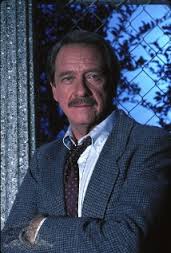
MURDER IN BLACK AND WHITE
US, 1990, 100 minutes, Colour.
Richard Crenna, Cliff Gorman, Diahann Carroll, Fred Gwynne, Philip Bosco, Keith David.
Directed by Robert Iscove.
Murder in Black and White is a routine, entertaining murder mystery with a New York city setting. Richard Crenna is a New York police investigator. The chief of police is murdered. It seems to be a racial issue since the officer was black. However, the investigations lead to a range of interesting characters and suspects while eventually looking into the police force itself. The supporting cast includes Cliff Gorman, Diahann Carroll, Fred Gwynn, Philip Bosco and an interesting cast.
1.Entertaining murder mystery? Victim, circumstances? Clues? Suspects?
2.New York City settings, Central Park, homes, police precincts, clubs and restaurants, hospitals? The musical score?
3.The title, the force wanting the mystery solved quickly? Racial implications?
4.Frank, his investigations, his team? As a person, background? His relationship with Stover's wife? His stances, investigations? The attack on him? The clues, the shoes? The confrontation with Brannigan? The solution of the crime? The efficient police officer?
5.The members of his staff: Aaron and his investigations, the ballet dancer, his misjudging her? Jean and her work in the office, visits, inquiries? John and his friendship and support? The efficiencies of the inquiries?
6.The victim, his background, his work in the police, marriages, anger with his son and his going to Canada as a draft dodger and the melodrama of his return? His ex-wife? Suspicions, the antagonism in the force? The response of black criticism? His relationship with Nadine and her giving clues? The investigation, looking for the documents in the files? The encounter with Brannigan - and his murdering him?
7.Brannigan, the history of police brutality, cover ups? His luring Charlie to the restaurant? Killing him? The mistake with the shoes? Killing the doctor and the nurse?
8.The vignettes of characters with interviews, suspicions? Bruno and Emma and their relationship and the body in the garden? The ballet dancer and her career? Nadine and her relationship with Charlie? The dead doctor, his deceiving his wife, the nurse and their deaths? His wife and her comments? The old man neighbour and his giving of information?
9.The intricacies of the plot, the development of the investigation, the emerging of the clues and issues? Satisfactory resolution?
10.Themes of the New York police, violence, corruption and cover ups? Race relationships? Integrity?
Published in Movie Reviews
Published in
Movie Reviews
Tagged under
Saturday, 18 September 2021 19:33
Murderer Lives at No 21, The/ L'Assassin Habite Au 21
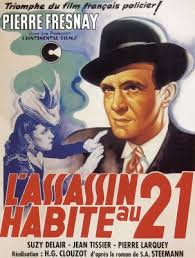
THE MURDERER LIVES AT NO.21 (l'ASSASSIN HABITE AU 21)
France, 1947, 83 minutes, Black and White.
Pierre Fresnay, Suzy Delair.
Directed by Henri- Georges Clouzot.
The Murderer Lives at No.21 is a '40s murder mystery set in France. It is the first film of celebrated director Henri-Georges? Clouzot, director of Les Diaboliques and The Wages of Fear.
The film has a tongue-in-cheek approach to its story of a serial killer, the presentation of the victims, the blustering of the bureaucratic police, the suave manner of the detective, the eccentricities of his opera-loving girlfriend, the possible suspects and their unmasking.
The film is brief, in black and white, an example of French film-making during the war years.
1.Entertaining murder mystery? Brevity? Emphasis on style and genre rather than smooth presentation of crime and detection?
2.French film-making during World War Two, black and white photography, editing and pace, stylised sets? The blend of the serious and the comic? The cast and the director?
3.The title, its tone, the information given to the inspector, the suspects and the unmasking?
4.Wens as the detective, his idiosyncratic manner, his relationship with Mila and her own eccentricities? His clashes with the police chief? Investigation, supporting Mila and her desire to investigate? Going into number 21 after receiving the information, his cover? The confrontation, initial detection, identifying the killer - the arrest of Colin, of Lintz, the encounter with the carnival fakir, the confrontation with the three, their story and the truth? His shrewdness in getting the police to arrest them? His victory? An eccentric character?
5.Mila, her ambitions for singing, the audition, wanting to get her name on the front page, trailing the murderer without lights on her car etc? The interaction with the people at number 21? Her lack of confidentiality? Her singing in the final concert?
6.The police chief, the usual portrait of a bumbling bureaucrat? Credit and blame?
7.The presentation of the victims, the man who won the lottery, the pay chief? Miss Coq? The build-up of atmosphere about the serial killer?
8.The people at number 21: the landlady and her running of things, the other guests, suspicions, the deaths, Miss Coq in the bath, stories, suspicions within the house? The vindication of the accused? The final party and celebration?
9.The irony of the solution - the story of schooldays and the idea of their working as a team? Their greed and callousness? The motivation of each, each claiming responsibility? Colin and his seeming ineffectualness? In prison and released? Lintz and his interrogation, his breaking down and confessing? The fakir and his performance on stage? His callousness and the murder? Their arrest?
10.Minor characters in the house - the landlady, Kid Roberts and his being blind, the clues from his hearing? The nurse and her concern?
11.Popular murder mystery styles, '40s French style?
Published in Movie Reviews
Published in
Movie Reviews
Tagged under